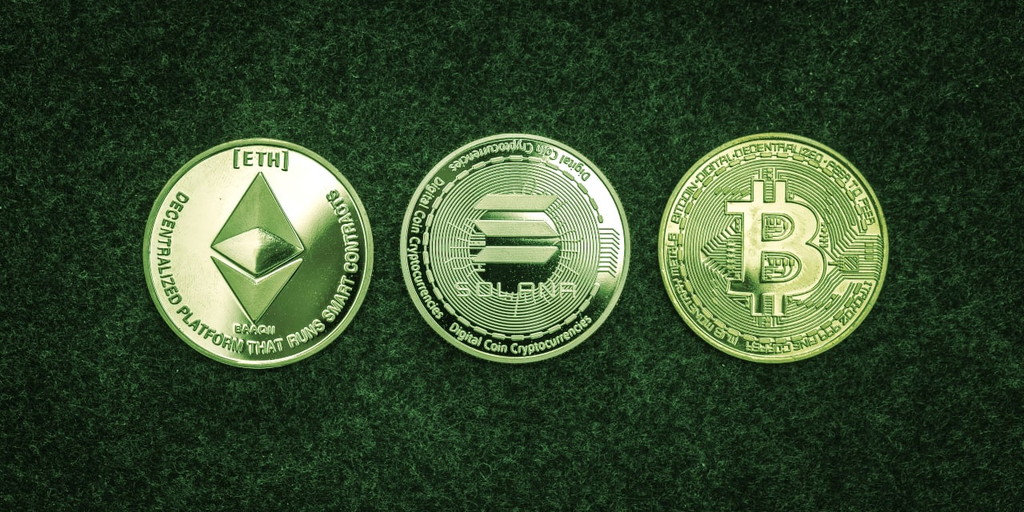
Last week was the first real red week of 2023 thanks to an SEC crackdown on Kraken and staking that shook crypto confidence, but most leading cryptocurrencies managed to recover value this week.
Bitcoin (BTC) rose 13.7% over the past seven days to hit $24,608 as of Saturday morning, according to CoinGecko data, after briefly reclaiming $25k on Thursday. The world’s number one cryptocurrency is currently being buoyed by the success of Ordinals, a popular NFT project on the blockchain.
Due to its limited functionality smart contracts (relative to closest competitor Ethereum), Bitcoin isn’t typically known for NFTs, but the number of Ordinals minted on it has hit 130,000 since the project’s launch last month.
Ethereum (ETH), the world’s second largest cryptocurrency by market cap, rose 12% over the last seven days and currently trades for around $1,700.
Both market leaders briefly traded sideways on Valentine’s Day as investors chewed on the conclusions of the latest Consumer Price Index (CPI) report by the U.S. Bureau of Labor Statistics. Inflation in January hit 6.4%, overshooting the Bureau’s expectations by 0.2%, however it has generally been receding since June last year.
Cardano (ADA) enjoyed a strong rally of 12% after the network dropped its Valentine upgrade. Valentine improves cross-chain functionality and security for dapps on Cardano. The blockchain’s native token’s price is currently around $0.40.
Strong rallies were enjoyed by holders of Avalanche (AVAX), which rose 10.4% to $19.66; Tron (TRX), which climbed 12% to $0.07; Litecoin (LTC), which went up 10% to $101, Solana (SOL), which surged 14% to $23, Lido DAO (LIDO), which spiked 13% to hit $3, and Polkadot (DOT), which blew up 17% to $7.31.
But three other names from the top 30 blew the rest out of the water: Filecoin (FIL) mushroomed 55% to trade at $7.43; OKB popped 30% over seven days to hit $52.98; and Polygon (MATIC) jumped 25% to $1.54.
No significant losses were posted by any of the top thirty cryptocurrencies by market cap, and virtually all of them appreciated in value this week.
Crypto politics in Europe and the Americas
The past week’s coin rally was despite the fact that indications from regulators didn’t improve.
Crypto markets shrugging off major regulatory headwinds (as well as monetary headwinds) in the short-term seems a little weird to me
— Ash Bennington (@AshBennington) February 14, 2023
On Tuesday, UK’s Financial Conduct Authority issued a press release to say that it is cracking down on unregistered crypto ATMs, having found several of them operating in the city of Leeds, England. The FCA’s executive director of enforcement and market oversight Mark Steward said: “Crypto businesses operating in the UK need to be registered with the FCA for anti-money laundering purposes.”
That same day across the Atlantic, lawmakers and experts met in Washington D.C. to discuss crypto regulation but failed to come to a consensus on how to go about it, with some encouraging a more heavy-handed approach than others. Notably, SEC chair Gary Gensler wasn’t present, despite being one of the most vocal and visible potential regulators of the industry. Lawmakers noted that he should attend the committee’s next hearing.
On Wednesday, the European Central Bank (ECB) issued guidance telling European banks that due to crypto’s inherent risk, they should apply caps on any holdings even before the Basel Committee on Banking Supervision’s (BCBS) global standards come into force in 2025. The move comes a week after the bloc published a new legal draft obliging banks under law to assign crypto the highest possible risk rating.
And the SEC continued its crackdown streak this week, bringing enforcement actions big and little: a high-profile case against Terraform Labs and Do Kwon, and a minor $1.4 million fine against former NBA star Paul Pierce for shilling EthereumMax, the same token Kim Kardashian got fined $1.26 million for promoting.
SEC Commissioner Hester Pierce on Thursday took to Twitter to criticize her agency’s crypto custody proposal. In it, she specifically mentioned the proposal’s timing, workability, and the agency’s jurisdiction as potentially problematic and said the public need more time to analyze and discuss it. You can hear her extensive interview on the SEC’s approach to crypto on Decrypt‘s gm podcast from December.

















